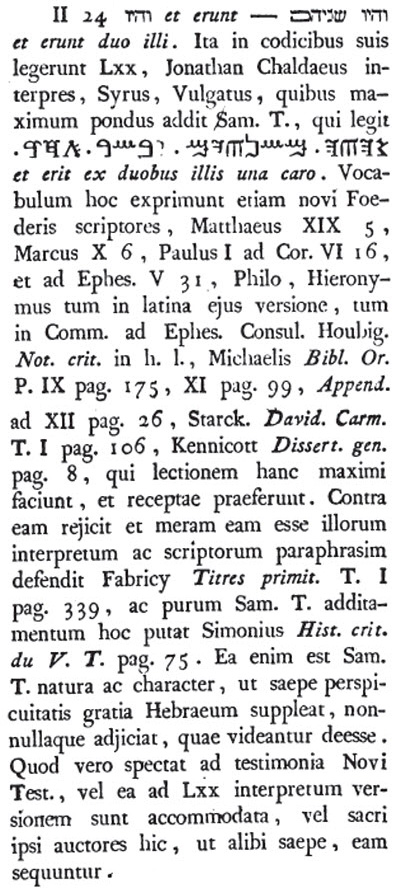על כן יעזב אישׁ את אביו ואת אמו ודבק באשׁתו והיה משׁניהם לבשׂר אחד׃
Gen 2:24 [Samaritan]
על כן יעזב אישׁ את אביו ואת אמו ודבק באשׁתו והיה משׁניהם לבשׂר אחד׃
For this reason a man shall leave his father and his mother, and be united to his wife, and they both will become one flesh.
Gen 2:24 [Masoretic]
עַל־כֵּן יַֽעֲזָב־אִישׁ אֶת־אָבִיו וְאֶת־אִמֹּו וְדָבַק בְּאִשְׁתֹּו וְהָיוּ לְבָשָׂר אֶחָֽד׃
For this reason a man shall leave his father and his mother, and be united to his wife, and they will become one flesh.
Gen 2:24 [Targum Onkelos]
עַל כֵּן יִשְׁבּוֹק גְּבַר בֵּית מִשְׁכָּבֵי אֲבוּהִי וְאִמֵּיהּ וְיִדְבֵּק בְּאִתְּתֵיהּ וִיהוֹן לְבִסְרָא חַד:
For this reason a man shall forsake the sleeping‑house of his father and his mother, and be united to his wife, and they will become one flesh.
Gen 2:24 [Samaritan Targum]
בדיל כן ישבק גבר ית אבוה וית אמה ויתעלץ באתתה והוו משניהון לבסר חדה:
For this reason a man shall forsake his father and his mother, and be united to his wife, and they both will become one flesh.
Gen 2:24 [Peshitta]
ܡܛܠ ܗܢܐ ܢܫܒܘܩ ܓܒܪܐ ܠܐܒܘܗܝ ܘܠܐܡܗ ܘܢܩܼܦ ܠܐܢܬܬܗ܂ ܘܢܗܘܘܢ ܬܪ̈ܝܗܘܢ ܚܕ ܒܣܪ܂
For this reason a man shall leave his father and his mother, and be united to his wife, and they two will become one flesh.
Gen 2:24 [Septuagint]
Ἕνεκεν τούτου καταλείψει ἄνθρωπος τὸν πατέρα αὐτοῦ καὶ τὴν μητέρα αὐτοῦ, καὶ προσκολληθήσεται πρὸς τὴν γυναῖκα αὐτοῦ· καὶ ἔσονται οἱ δύο εἰς σάρκα μίαν.
For this reason a man shall leave his father and his mother and shall cleave to his wife, and they two shall be one flesh.
Gen 2:24 [Old Latin (Vetus Latina)]
Et propter hoc relinquet homo patrem et matrem, et conglutinabitur uxori suae : et erunt duo in carne una.
And for this reason a man shall leave father and mother, and be conglutinated to his wife, and they shall be two in one flesh.
Gen 2:24 [Vulgate]
Quam ob rem relinquet homo patrem suum, et matrem, et adhaerebit uxori suae : et erunt duo in carne una.
For this reason a man shall leave his father and mother, and shall cleave to his wife, and they shall be two in one flesh.
עַל־כֵּן֙ יַֽעֲזָב־אִ֔ישׁ אֶת־אָבִ֖יו וְאֶת־אִמֹּ֑ו וְדָבַ֣ק בְּאִשְׁתֹּ֔ו וְהָי֖וּ לְבָשָׂ֥ר אֶחָֽד׃
Therefore a man shall leave his father and his mother and cling to his wife, and they shall become one flesh.
Morphology
- עַל־כֵּן֙ (ʿal-kēn) – Root: כן (k-n); Form: Preposition with adverb; Translation: “Therefore”; Notes: Indicates a conclusion drawn from the preceding narrative.
- יַֽעֲזָב (yaʿazov) – Root: עזב (ʿ-z-b); Form: Qal imperfect, third masculine singular; Translation: “he shall leave”; Notes: Future tense indicating a prescribed action.
- אִ֔ישׁ (ʾīš) – Root: איש (ʾ-y-š); Form: Noun, singular masculine; Translation: “man”; Notes: Refers to the male individual.
- אֶת־אָבִ֖יו (ʾet-ʾāviv) – Root: אב (ʾ-ʾ-b); Form: Particle with noun, singular masculine, third-person singular suffix; Translation: “his father”; Notes: The direct object marker introduces the person left.
- וְאֶת־אִמֹּ֑ו (wəʾet-ʾimmō) – Root: אם (ʾ-m); Form: Conjunction with particle and noun, singular feminine, third-person singular suffix; Translation: “and his mother”; Notes: Conjoins with the previous direct object.
- וְדָבַ֣ק (wəḏāvaq) – Root: דבק (d-b-q); Form: Qal perfect, third masculine singular; Translation: “and he shall cling”; Notes: Indicates a strong attachment.
- בְּאִשְׁתֹּ֔ו (bəʾištō) – Root: אשה (ʾ-š-h); Form: Preposition with noun, singular feminine, third-person singular suffix; Translation: “to his wife”; Notes: Indicates the object of clinging.
- וְהָי֖וּ (wəhāyū) – Root: היה (h-y-h); Form: Qal perfect, third masculine plural; Translation: “and they shall become”; Notes: Refers to the couple becoming unified.
- לְבָשָׂ֥ר (ləḇāśār) – Root: בשר (b-ś-r); Form: Preposition with noun, singular masculine; Translation: “one flesh”; Notes: Metaphor for unity and intimacy.
- אֶחָֽד (ʾeḥāḏ) – Root: אחד (ʾ-ḥ-d); Form: Adjective, singular masculine; Translation: “one”; Notes: Highlights the complete union.
